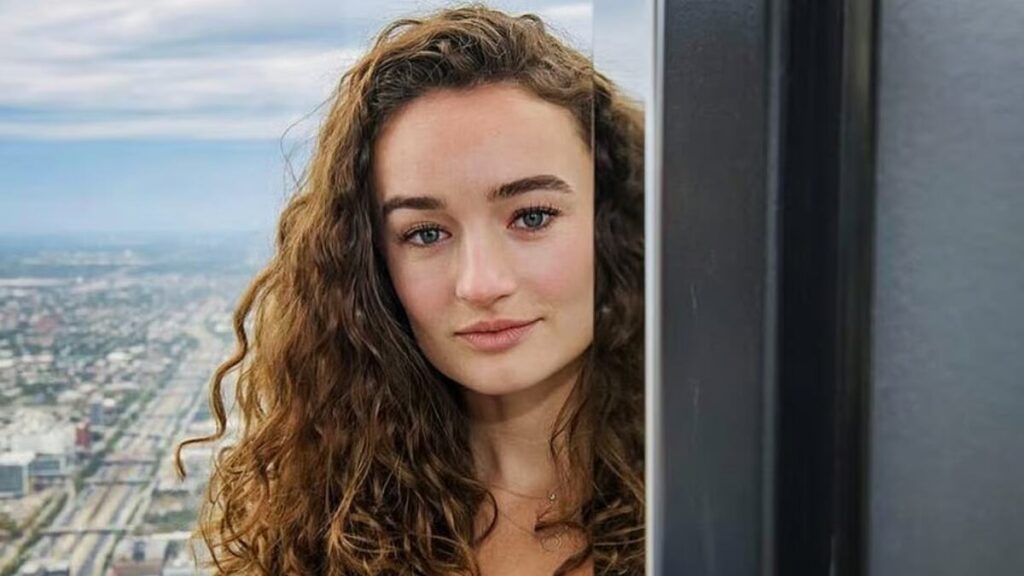When news broke of Kelley Mack’s sudden passing at just 33, it felt like more than a celebrity headline—it felt personal. For fans of The Walking Dead, indie cinema, or even the quiet corners of YouTube where she occasionally appeared, Kelley wasn’t just an actress. She was a presence. Unassuming but magnetic. Funny, fierce, and full of creative fire.
Her death sparked an outpouring of grief, but also curiosity: Who was she? What had she built behind the scenes? And what becomes of a legacy—financial and artistic—when a life is cut short before it’s fully seen?
In this piece, we’ll explore the facts we know about Kelley Mack’s estate, earnings, and creative portfolio. But we’ll also go deeper: examining how her influence lingers, how income continues after death in the entertainment industry, and why value doesn’t always show up on a balance sheet.
A Rising Star Lost Too Soon: Kelley Mack’s Life in Brief
From The Walking Dead to Indie Darlings: Her Career Trajectory
Kelley Mack didn’t crash into Hollywood — she crept in, quietly carving a space where complex, offbeat characters could breathe. While many remember her as Addy in The Walking Dead, a recurring role that introduced her to mainstream audiences, her real artistry lived in the indie film circuit. She gravitated toward emotionally rich, often challenging stories — small-budget projects where acting wasn’t about glamour but grit.
What set her apart in an industry that often rewards loud ambition was her restraint. Whether playing a haunted protagonist in a micro-budget drama or a nuanced supporting role in a web series, Kelley brought an indie actress’s integrity to everything she touched.
Her early success wasn’t marked by red carpets, but by quiet acclaim — the kind that spreads in whispers among directors, casting agents, and devoted viewers. And in an era of algorithm-driven fame, that made her rare.
Not Just an actress — Kelley’s Work as a Filmmaker & Producer
You wouldn’t know it from just her IMDb page, but Kelley Mack was more than the roles she played — she was a storyteller at heart. Behind the camera, she quietly built a portfolio of creative pursuits, including short films she wrote, produced, and occasionally directed. One of her passion projects, The Elephant in the Room, showcased her voice as a female filmmaker—sharp, intimate, and unapologetically honest.
These weren’t vanity pieces. They were proof that Kelley wasn’t waiting for permission from the industry — she was crafting her path. Her producer credits, though few, hinted at a long-term vision: creative autonomy and storytelling control.
While these projects didn’t always generate headline-worthy earnings, they likely created modest income through festivals, licensing, or digital distribution—and more importantly, they solidified her artistic legacy.
What We Know So Far About Her Estate & Financial Assets
Disclosed Assets and Estimated Net Worth at Time of Death
At the time of her passing, Kelley Mack’s reported net worth was estimated to fall between $500,000 and $1 million—a modest figure by Hollywood standards, but one that reflects the reality of many working actors navigating both mainstream and indie spaces. No official probate filings or estate disclosures have been made public yet, which isn’t unusual, especially for relatively private individuals or families still in mourning.
Actors in Kelley’s tier—recurring television roles, indie films, occasional producing credits—typically build income through a patchwork of residuals, digital assets, personal savings, and smaller-scale real estate holdings. While not every project leads to substantial upfront pay, long-tail earnings often come from streaming residuals or syndication royalties, especially for shows like The Walking Dead with global reach.
She may have also earned passive income from any licensed work, digital platforms, or self-produced projects submitted to streaming services or festivals.
Silent Success? The Private Nature of Her Wealth
Kelley Mack never struck the public as someone chasing the spotlight or splurging on celebrity. There were no luxury brand endorsements, no splashy headlines about million-dollar homes—just the quiet consistency of a working actor who let her craft speak louder than her lifestyle. She seemed, in every way, a quiet achiever—one of those rare talents more invested in meaningful roles than material rewards.
While details of her financial choices remain private, patterns suggest a life lived with intentional modesty. Her social media presence was light, focused more on art and collaboration than status. There’s been quiet chatter about her supporting smaller charities and indie creative funds, though nothing has been officially confirmed.
In a town where wealth is often broadcast for validation, Kelley’s low-key legacy feels almost radical. And ironically, it may have allowed her to build quiet financial resilience—through royalties, streaming payouts, and ownership of her creative work.
How Kelley’s Earnings Compare Within the Industry
In understanding Kelley Mack’s financial legacy, it’s helpful to compare her career trajectory with peers in similar roles—particularly other supporting actors from The Walking Dead and those rooted in indie film spaces. While exact numbers are elusive, public estimates can provide meaningful context.
Actors like Alanna Masterson (Tara) and Pollyanna McIntosh (Jadis/Anne), both of whom had more extended arcs and higher episode counts, are reported to have net worths ranging from $1.5 to $4 million. These figures reflect not only screen time, but often stronger negotiation positions under SAG-AFTRA’s tiered contracts, which reward recurring and central cast members. Kelley, as a recurring presence with fewer appearances, would likely fall into a lower earnings bracket—though not necessarily by a wide margin due to residuals and streaming-era backend deals.
Outside of The Walking Dead, Kelley’s indie work offered artistic value but rarely matched mainstream financial returns. Still, streaming platforms like Netflix and Amazon have leveled the playing field slightly—actors in niche projects can earn ongoing revenue if their work finds a second life on digital platforms.
Unlike some peers, Kelley didn’t pursue heavy social media monetization, which has become a growing income stream for actors. Her focus remained on storytelling—not branding.
What Happens to an Actor’s Revenue After Death?
Royalties, Residuals & Posthumous Income Explained
Even after an actor passes, their work can continue to generate income—sometimes for years. Through mechanisms like residuals, royalties, and digital syndication, Kelley Mack’s performances may still earn money for her estate or designated beneficiaries.
Think of it like this: every time someone re-watches her episodes of The Walking Dead on Netflix or AMC+, a small payment—negotiated through SAG-AFTRA’s streaming contracts—may be triggered. It’s a quieter kind of income, built over time rather than overnight. Unlike traditional TV syndication, where reruns were king, today’s streaming era offers a longer digital shelf life—meaning her work might stay discoverable and profitable far longer than past generations of actors experienced.
For an artist like Kelley, whose roles continue to resonate online and in fandom circles, that posthumous visibility can translate into tangible value.
Intellectual Property & Licensing Rights in the Digital Age
In today’s entertainment landscape, an actor’s work doesn’t always end with their final performance. Publicity rights, which govern how someone’s name, image, or voice is used, often extend far beyond their lifetime. For someone like Kelley Mack—who left behind a growing digital footprint—this opens both creative opportunities and legal questions.
Studios, streaming services, or even tribute creators may want to repurpose her likeness in the future. That could include AI-generated content, posthumous voiceovers, or even the controversial use of deepfake technology. While these tools are evolving rapidly, most responsible parties must first obtain permission from an estate or rights holder before using their image commercially.
This isn’t science fiction—it’s just the legal and ethical terrain of modern celebrity.
Reflecting on Kelley’s Creative Spirit
I remember watching Kelley Mack in The Walking Dead—not in a major plot arc, but in those quieter scenes where her eyes said more than the dialogue ever could. She had this stillness that didn’t scream for attention, but somehow drew yours anyway. At the time, I didn’t know her name. I just knew she felt real in a way that stuck.
It wasn’t until months later, during a late-night scroll through a film festival’s online shorts, that I stumbled upon a project she’d written and produced herself. That’s when it clicked. She wasn’t just performing—she was crafting. Building. Breathing life into stories that most people overlooked.
What I admired most was how unpolished it all was—not in a rough way, but in a human way. You could sense she wasn’t trying to be famous. She was trying to be honest.
That’s a rare currency in entertainment. And it lingers longer than any spotlight.
What We Know vs. What’s Been Speculated Online
In the wake of Kelley Mack’s passing, the internet did what it often does—filled in the blanks with speculation. Posts have circulated about the size of her estate, rumors of a secret will, and even unfounded claims of hidden wealth or disputes. As of now, no verified probate documents or public estate filings have been released, which is both normal and expected in the early months following someone’s death.
There has been speculation, but it’s important to remember that celebrity probate doesn’t always play out in public view—especially for artists who lived more privately, like Kelley. In most cases, the legal handling of a deceased person’s estate begins quietly, with lawyers and families navigating paperwork, beneficiaries, and privacy laws long before anything becomes public.
And while the internet is quick to assume silence equals secrecy, it more often reflects respect, shock, or grief. It’s okay to ask questions—but it’s just as okay not to have answers yet.
Charitable Work and Personal Causes
Kelley Mack wasn’t loud about her generosity—but those who followed her closely noticed the threads of empathy woven through her choices. While there are no high-profile foundations or headline-making donations tied to her name, she quietly supported several compassion-driven causes, particularly those focused on mental health awareness, animal welfare, and female-driven creative projects.

Friends and collaborators have hinted at her role as a silent giver—someone who offered support behind the scenes, whether by funding a short film or volunteering time to causes close to her heart. In interviews, she often spoke about the importance of “telling stories that make people feel less alone,” a mission that extended beyond her work onscreen.
Her legacy of kindness might not be tallied in dollars, but in the people she helped when no one was looking.
How Her Work Lives on in Fandom Spaces
In the weeks following Kelley Mack’s passing, something beautiful happened in the quiet corners of the internet. Fans—many of whom had never met her—began sharing tribute videos, posting hand-drawn art of her Walking Dead character, and filling Reddit threads with memories of scenes that stuck with them. On Instagram, memorial pages bloomed almost overnight, some filled with screenshots, others with long captions about how she made people feel seen.
This is fandom culture at its most human—grieving, honoring, and celebrating all at once. Like with Carrie Fisher or Chadwick Boseman, the mourning goes beyond celebrity. It’s about connection. For many, Kelley wasn’t just a character on a screen—she was the friend they imagined walking beside them through difficult moments, the quiet strength in stories that offered comfort.
In these online tributes, her legacy continues to ripple outward. Her face, her voice, her performances—preserved in pixels, yes, but alive in meaning.
Accounting for More Than Dollars
When we talk about someone’s legacy, especially in the world of entertainment, it’s tempting to measure it in numbers—net worth, box office earnings, contract deals. But with Kelley Mack, that lens feels too small.
Her impact wasn’t loud, but it was lasting. It lived in the roles she chose, the voices she gave space to, and the quiet strength that threaded through her work. She made a mark not by dominating headlines, but by showing up with depth, grace, and creative honesty.
The value of a life like Kelley’s can’t be summarized in estate filings or royalty checks. It’s something softer, harder to trace—but deeply felt by those who noticed.
Nishant Wagh is the founder of The Graval and a seasoned SEO and content strategist with over 15 years of experience. He writes with a focus on digital influence, authority, and long-term search visibility.















4 thoughts on “Kelley Mack’s Estate & Earnings: What We Know After Her Sudden Passing at 33”